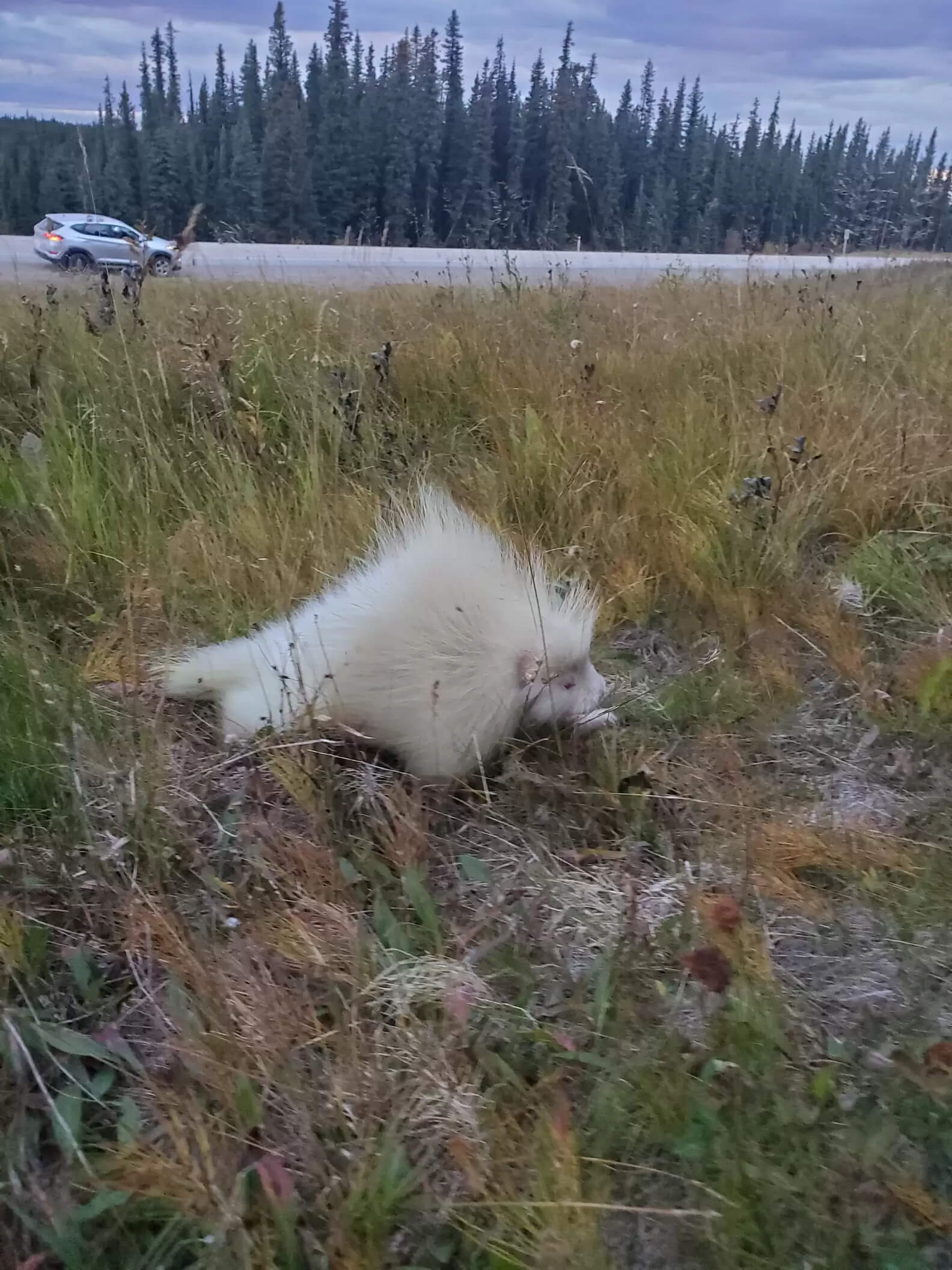Woman Discovers Remarkable Find After Noticing White 'Rock' On Roadside
Traveling down a quiet road in Alberta, Canada, Emerice Hallock and her brother stumbled upon an extraordinary sight not long ago. What they encountered was not your typical woodland creature but a rare albino porcupine, a unique find that left them in awe.
Albino animals, with their striking white appearance due to a lack of pigmentation, are exceptionally rare. Reports suggest that only one out of every 10,000 porcupines displays this trait.
So, when Hallock's brother spotted the unusual figure in the brush beside the road, it sparked excitement and disbelief. Initially mistaking it for a rock due to their car's speed, Hallock's brother insisted on turning back for a closer look.
As they approached, their initial skepticism turned into wonder as they confirmed the sighting: it was indeed an albino porcupine. Hallock, having never seen a porcupine before, was particularly amazed by the encounter.
The creature's all-white fur and quills stood out starkly against the backdrop of the forest. Its presence seemed almost magical, as if it knew it was something special.
Exiting their vehicle for a better view, Hallock and her brother watched in fascination as the albino porcupine moved gracefully through the brush. Despite its rarity, the creature appeared healthy and content, as if embracing its uniqueness.
After a brief but unforgettable encounter, the porcupine eventually retreated into the forest, leaving Hallock and her brother with a lasting memory. Reflecting on the experience, Hallock remarked, "It's certainly something that I will remember."
Indeed, spotting such a rare and remarkable creature is an experience that few are fortunate enough to witness firsthand.
In the bushes by the side of the road, they noticed a lone, bright white shape.

To their surprise, it was an albino porcupine, which is extremely rare.

Albino porcupines are a rare and fascinating variant of the usual porcupine species, distinguished primarily by their lack of pigmentation due to a genetic condition known as albinism. This condition results in their characteristic white or pinkish quills, skin, and eyes, making them particularly unique in appearance.
Unlike their typically darker relatives, albino porcupines are more sensitive to sunlight due to the absence of protective melanin in their skin and eyes, which can lead to vision problems and a higher susceptibility to skin damage or cancers. They may also face greater challenges in their natural habitats, as their bright coloring makes them more visible to predators.
Despite these challenges, albino porcupines display the same behaviors as their pigmented counterparts. They are primarily nocturnal, using their sharp quills as a defense mechanism against predators.
Their diet mainly consists of leaves, herbs, twigs, and bark, which they are adept at finding with their keen sense of smell. Albino porcupines are a remarkable example of nature’s variability, showcasing how genetic diversity manifests in the animal kingdom.
Psychological Analysis
This situation illustrates the joy that can come from unexpected discoveries. Curiosity plays a vital role in our ability to appreciate life's surprises, and fostering this trait can lead to greater fulfillment. It's essential for individuals to remain open to new experiences to enhance their overall happiness.
Analysis generated by AI
Analysis & Alternative Approaches
Understanding the psychological dynamics of unexpected discoveries can enhance our appreciation for life's surprises. Research highlights the importance of curiosity and openness in fostering joy and resilience. By embracing the unexpected, we can enrich our lives and enhance our overall well-being.
Seeing the albino porcupine is like a significant sign telling us to take care of nature. With habitats disappearing and animals becoming harder to find, moments like these remind us how special our world is.
We need to do our part to protect it so our kids and grandkids can enjoy amazing sights like this too. It's a reminder that we all need to pitch in and keep our planet safe for everyone.
The Psychology of Unexpected Discoveries
Unexpected discoveries often evoke a sense of wonder and curiosity, tapping into our innate desire for exploration. Dr. Jonathan Haidt, a social psychologist, notes, "Surprising moments can activate our brain's reward system, leading to feelings of joy and excitement." Research indicates that positive surprises can enhance mood and well-being, contributing to a greater sense of life satisfaction. According to studies highlighted by Dr. Jonathan Haidt, engaging with novel experiences can foster creativity and cognitive flexibility, further enhancing our psychological resilience.
Moreover, the concept of serendipity plays a significant role in our understanding of unexpected finds. A researcher in behavioral psychology notes that serendipitous moments often occur when individuals are open to new experiences and willing to explore the unknown. This openness can lead to unexpected joys and discoveries that enrich our lives.
The Role of Curiosity in Personal Growth
Curiosity is a powerful driver of personal growth and learning. A developmental psychologist emphasizes that fostering curiosity can lead to greater engagement with the world around us. Research indicates that individuals who cultivate their curiosity often report higher levels of happiness and fulfillment, as they actively seek out new experiences and knowledge.
This can involve adopting a mindset of exploration, where individuals view challenges as opportunities for growth rather than obstacles.
Understanding the psychological impact of curiosity can help individuals embrace the unknown. A cognitive scientist points out that curiosity encourages a growth mindset, promoting resilience and adaptability. This mindset can significantly enhance one’s ability to navigate life's uncertainties and embrace unexpected discoveries.
Practical Strategies for Embracing the Unexpected
To foster a sense of curiosity and openness to unexpected discoveries, experts recommend engaging in activities that challenge comfort zones. This can include exploring new hobbies, meeting new people, or visiting unfamiliar places. Research shows that stepping outside of familiar patterns can lead to enriching experiences that enhance well-being.
Additionally, keeping a journal to document unexpected finds can help individuals reflect on their experiences and reinforce their sense of wonder and gratitude.



